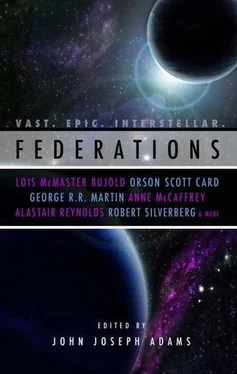“Why didn’t you let yourself out?” Theowane asks. “Isn’t there an emergency release inside?”
The boy turns a look of scorn to her. “I know what’s in the air on Bastille, and in the water. I couldn’t see where I was. It might be bad to be cramped in this coffin for hours—but it would be plenty worse to take a shower in sulfuric acid.” He pauses for just a moment. “And speaking of showers, can I get out of here and take one?”
• • •
After the boy has cleaned and rested himself, Amu summons him for dinner. The other prisoners on Bastille have expressed their curiosity, but they will have to wait until Amu decides to make a statement.
“Dybathia,” the boy says when Amu asks his name. “I know it sounds noble and high-born. My parents had high expectations of me.” He stops just long enough for Amu to absorb that, but not long enough for him to ask any further questions.
“I ran away from home,” Dybathia says. “It took me a week to make it to the spaceport. When I got there, I slipped onto the first open ship and hid in their cargo bay. I didn’t care where it was going, and I didn’t plan to show myself until we were on our way into hyperspace. I figured anyplace was better than home, right?” He snickers.
“It turned out to be a PEACE ship. They wouldn’t let me off. They kept me around, constantly quoting tracts at me, trying to make me convert. Do my eyes look glazed? Am I brain-damaged?”
Amu allows a smile to form, but he does not answer.
Dybathia says, “They shut off their servo-maintenance drones and made me do the cleaning, scrubbing down decks and walls with a solvent that should have been labeled as toxic waste. Look at my hands! The captain said monotonous work allows one to clear the mind and become at peace with the universe.”
Theowane breaks into the conversation, “Why were you the only one who got to an escape pod?” Amu looks up at her sharply, but she doesn’t withdraw the question.
Dybathia shrugs. “I was the only one who bothered. The rest of them just sat there and accepted their fate.”
This rings so true with Amu from his memories of his parents that he finds himself nodding.
• • •
Dybathia looks at the mind-scanning apparatus; this will be the most dangerous moment for him. The device is left over from the first days of Bastille, when human supervisory crews had established the colony. That month had been the only time when non-prisoners and prisoners cohabited the planet; as a precaution they had used intensive search devices and mental scanners, which had remained unused since those other humans had turned Bastille over to the Warden.
“You do understand why we have to do this?” Amu asks.
Dybathia sees more concern on the face of the leader than he expects. This is going better than he had hoped. “Yes, I understand perfectly.” He flicks his gaze toward Theowane, then back to Amu. “It’s because she’s paranoid.”
Theowane bristles, as he expects her to. She makes each word of her answer clipped and hard. “Your story is too convenient. How do we know you’re not an… assassin? What if you’ve been drugged or hypnotized? We can’t know what the Praesidentrix might do.”
Knowing it is imperative for him to allay their suspicions, Dybathia submits to an intensive physical search that scans every square centimeter of his body, probes all orifices, uses a sonogram to detect any subcutaneous needles, poison-gas capsules, perhaps a timed-release biological plague.
They find nothing, because there is nothing to find.
“The psyche assessor won’t hurt you,” Amu says. “Just stick your head within its receiving range.”
“How does it work?” Dybathia asks. He frowns skeptically. “How do I know this isn’t one of those machines to condition prisoners? I don’t want to end up like a PEACE convert.”
“Explain it to him, Theowane.” Amu smiles at her, as if he knows how it will rankle her.
Theowane blows air from her lips. “Everyone has a basic mental pattern, like a normal position that can never change. However, certain training—brainwashing, you’d call it—can superimpose another set of reactions on top of it. If you’ve been brainwashed or specially trained to do anything to Amu, or Bastille, it will show up here.” She adjusts her apparatus.
Dybathia rolls his eyes. Amu smiles at that. Dybathia knows he is easing past the leader’s defenses. “Let’s just get this over with.”
Without a word, the boy leans into the psyche assessor’s range. Theowane makes no other comment as she works with the apparatus and takes her reading. She asks him a series of questions designed to break down mind-blanking techniques.
Dybathia answers them all without resisting.
Finally, Theowane shrugs. “It’s clear,” she says. “No one’s been messing with his mind. He has no special training. He hasn’t been brainwashed.”
“I could have saved you trouble if you had just listened to me in the first place.”
Amu claps a hand on the boy’s shoulder. “I’ll let you know when I’ve thought of a suitable way for Theowane to apologize.”
• • •
When the survivor of the PEACE ship comes through with Theowane and Amu, I receive the unmistakable impression of tourist and tourguides. No, that is not quite correct… more like a visiting dignitary being shown points of interest.
Inside the forcewalls I watch them. True, I have a million different eyes around Bastille, optics to observe through, from monitoring cameras around the corridors, to the remote sensors of automatic digging machines. But my real eyes are here.
Purposely, I think, Amu ignores me as he brings the boy down the corridor. He points to the auxiliary control systems, explaining them with deceptive ease, making them sound simpler than they are. The three keep their backs pointedly turned and walk to the viewing window, outside of which the diggers continue their relentless excavations. The sky swirls with dark, oily colors over the hostile sea.
“It’s going to be generations before anybody can bask under the Bastille sun, but at least it is now ours,” Amu says, then lowers his voice. “And we aren’t going to give it back when this world becomes habitable.”
“Is it going to be worth the wait?” the boy asks, pushing his face close to the thick glass. I flick my concentration to one of the digger machines outside, looking through a different set of eyes, but the coarse optics and the glass distort the boy’s face through the window.
Amu shrugs and rubs a hand on his silvery beard. “Theowane spends hours down here staring out the window. Actually, I think she just likes to taunt the Warden.”
Finally, they turn toward me. I am too familiar with Theowane’s close-cropped reddish hair and her narrow, hard eyes. Amu carries much more capacity within him—an extraordinary person, with charisma and intelligence and compassion that allows him to do virtually anything he wants to. But he has chosen a path that society deems unacceptable.
The boy is the last to turn away from the sprawling view. He looks at me directly. I see him.
I know him.
He has counted on me recognizing him.
Instantly, I flash through a handful of buried newsclips, quick photographs shaded by the promise of anonymity, but it is enough. It augments my suspicions. I can remember few details of the person on whom I myself have been based, but some things are impossible to erase.
I remember.
I wonder what he is up to. Why is he here, and what am I supposed to do about it?
The three visitors say no word to me as they continue their tour. I am left with the absolute conviction that the fate of Bastille, and perhaps the Praesidentrix’s Federation, depends upon me recognizing this boy, understanding what he wants, and acting accordingly.
Читать дальше












